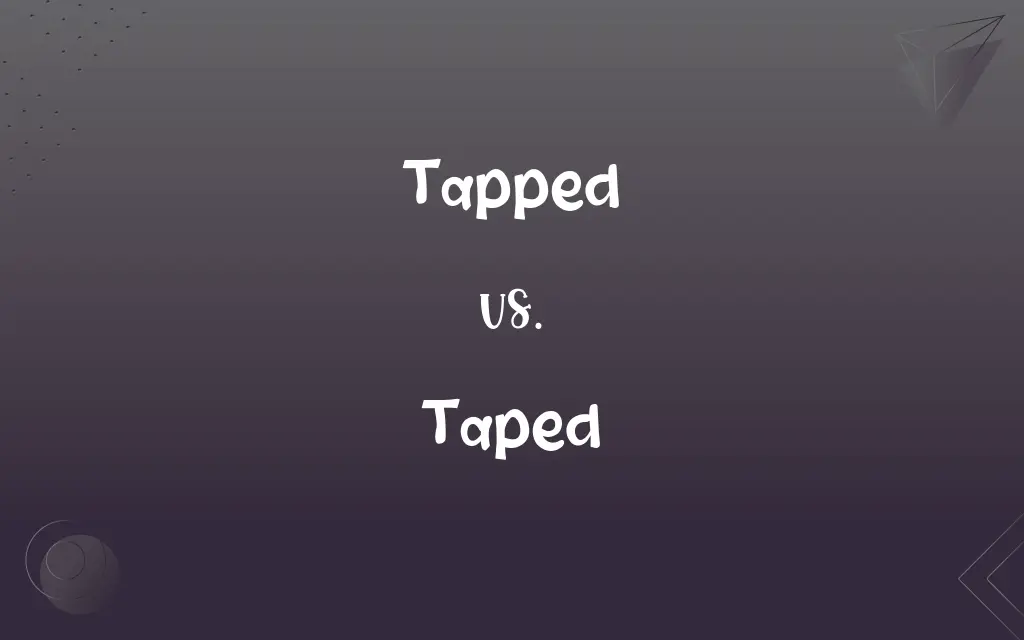Tapped vs. Taped: What's the Difference?
Edited by Aimie Carlson || By Janet White || Updated on February 5, 2024
"Tapped" refers to lightly hitting or accessing resources, while "taped" means securing or recording with adhesive tape or audio/video media.

Key Differences
"Tapped" and "taped" differ significantly in both application and meaning. "Tapped" can refer to the act of lightly touching or striking something, often to draw attention or produce a sound. It also signifies accessing a resource or information, as in tapping into an energy source or knowledge base. Conversely, "taped" involves the use of tape, either for the purpose of adhering objects together or recording audio or visual data. This difference highlights the physical interaction of tapping versus the material or recording function of taping.
In another context, "tapped" can describe the selection or appointment to a position or role, such as being tapped for a leadership role. This usage underscores a metaphorical act of selection, implying a deliberate choice or designation. "Taped," in contrast, remains firmly in the physical realm, whether referring to binding objects with adhesive tape or capturing moments through audio or video recording. This distinction emphasizes the action of securing or recording with "taped" against the figurative or literal act of selecting or accessing with "tapped."
The nuance of "tapped" extends into various fields, including technology, where it can denote initiating a function or feature through a light touch, as on a touchscreen device. This sense of "tapped" reflects a broader application in the digital age, contrasting with "taped," which, despite its use in recording, suggests a more traditional or physical form of capturing or securing. The evolution of "taped" to include recording also speaks to its adaptability, but its foundation remains materially based.
When considering resources, "tapped" often implies a sustainable or controlled utilization, such as tapping a keg or tapping into solar power. This usage conveys a sense of extraction or utilization without depletion. On the other hand, "taped" does not carry implications of resource management but focuses on the method of attachment or the act of recording, each with distinct purposes and outcomes. The context of use thus significantly diverges, with "tapped" suggesting a broader, sometimes metaphorical application, and "taped" indicating specific physical actions.
"Tapped" can convey a subtlety in interaction, such as in social or digital engagements, symbolizing minimal yet effective contact. "Taped," however, underscores a tangible action—either affixing with a sticky substance or capturing audiovisual data. These distinctions underline the tactile versus the material and recording aspects of "tapped" and "taped," showcasing the unique applications and connotations of each word within various contexts.
ADVERTISEMENT
Comparison Chart
Meaning
Refers to lightly hitting or accessing resources.
Involves securing with adhesive tape or recording media.
Context of Use
Can be metaphorical (selecting) or physical (touching).
Primarily physical (binding or recording).
Associated Actions
Touching lightly, selecting, accessing.
Adhering, capturing audio/visual content.
Implications
Implies a sustainable or controlled utilization of resources.
Focuses on attachment or preservation.
Technological Relevance
Often used in digital contexts (e.g., tapping a screen).
Refers to traditional recording methods or physical securing.
ADVERTISEMENT
Tapped and Taped Definitions
Tapped
To lightly touch.
She tapped the table to catch his attention.
Taped
To record audio or video.
The concert was taped for broadcast.
Tapped
To initiate a function on a touchscreen.
She tapped the icon to open the app.
Taped
To secure with adhesive tape.
The box was taped shut before shipping.
Tapped
To appoint or select for a role.
He was tapped as the project lead.
Taped
To attach or bind using tape.
Posters were taped to the wall.
Tapped
To extract liquid from a source.
They tapped a new barrel of beer for the festival.
Taped
To mark or delineate an area with tape.
The crime scene was taped off.
Tapped
To access a resource or information.
The company tapped into renewable energy sources.
Taped
To repair or reinforce with tape.
The book's spine was taped to prevent further damage.
Tapped
To strike gently with a light blow or blows
I tapped you on the shoulder to get your attention.
Taped
A continuous narrow, flexible strip of cloth, metal, paper, or plastic, such as adhesive tape, magnetic tape, or ticker tape.
Tapped
To give a light rap with
Tap a pencil.
Taped
A narrow strip of strong woven fabric, as that used in sewing or bookbinding.
FAQs
Can "taped" refer to both physical and digital recordings?
Yes, "taped" can refer to traditional physical recordings and, colloquially, to digital recordings.
Is tapping a screen the same as pressing it?
Tapping implies a lighter, quicker touch than pressing, which may require more force or duration.
How is adhesive tape related to the word "taped"?
"Taped" directly refers to the act of using adhesive tape to secure or attach items.
Can objects be tapped digitally?
Yes, in digital contexts, tapping refers to interacting with objects on a touchscreen.
Is all audio or video recording considered "taped"?
Historically, yes, but with digital technology, "recorded" is more accurate, though "taped" is still used colloquially.
What does it mean to tap into a resource?
It means to access or utilize a resource, often implying efficient or innovative usage.
How does taping something for repair work?
Taping for repair involves using adhesive tape to hold together or reinforce a damaged item.
Can "tapped" imply a temporary selection?
Yes, being tapped for a role or duty can be either temporary or permanent, depending on the context.
Is tapping a beer keg literal or metaphorical?
Literal; it refers to the physical act of opening a keg to access the beer.
Is being tapped an honor?
It can be, especially if the selection is for a prestigious role or responsibility.
Can you tap a phone conversation?
Yes, but the correct term is "wiretap," which involves monitoring and recording phone communications.
What does it mean to be tapped for a position?
It means being selected or appointed to a specific role or duty.
What does tapping a card mean in digital payments?
It refers to the act of lightly touching a payment card against a reader to make a transaction.
Can tapping be used in music?
Yes, tapping on musical instruments, like drums or touchscreens, can produce sounds or effects.
What types of tape are used for taping?
Various types, including duct tape, masking tape, and electrical tape, depending on the purpose.
Can you tape a live event for later viewing?
Yes, taping a live event allows it to be watched at a later time.
Does tapping a phone require physical access?
Traditionally, yes, but modern technology can allow remote wiretapping.
Can something be both tapped and taped?
Yes, in different contexts; for example, a keg can be tapped for beer, and a broken handle can be taped for repair.
Is taped artwork secure?
Taping can temporarily secure artwork, but its permanence depends on the tape quality and surface.
Are taped interviews only on video?
Taped interviews can be on video or audio, depending on the recording method.
About Author
Written by
Janet WhiteJanet White has been an esteemed writer and blogger for Difference Wiki. Holding a Master's degree in Science and Medical Journalism from the prestigious Boston University, she has consistently demonstrated her expertise and passion for her field. When she's not immersed in her work, Janet relishes her time exercising, delving into a good book, and cherishing moments with friends and family.
Edited by
Aimie CarlsonAimie Carlson, holding a master's degree in English literature, is a fervent English language enthusiast. She lends her writing talents to Difference Wiki, a prominent website that specializes in comparisons, offering readers insightful analyses that both captivate and inform.
































































